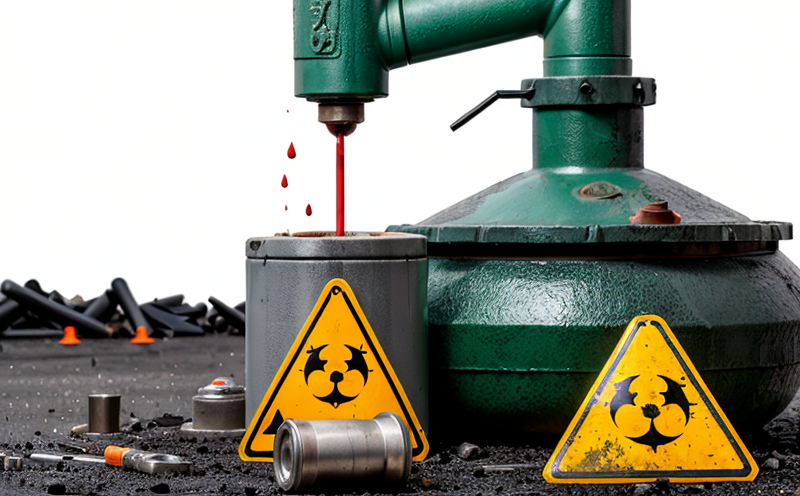Benzene Hazardous Compound Analysis in Fuels
The analysis of benzene in fuels is a critical process that ensures compliance with environmental regulations and safety standards. Benzene, a known carcinogen, poses significant health risks to both consumers and the environment if present in fuel supplies at high concentrations. This service focuses on identifying and quantifying benzene within gasoline, diesel, jet fuel, and other petroleum-based products.
Our laboratory employs advanced chromatographic techniques, such as Gas Chromatography-Mass Spectrometry (GC-MS), to detect trace amounts of benzene in complex fuel matrices. This method allows for precise quantification down to parts per billion levels, ensuring accurate assessment of the compound's concentration.
The importance of this analysis cannot be overstated given its role in safeguarding public health and environmental integrity. Regulatory bodies like the Environmental Protection Agency (EPA) and Occupational Safety & Health Administration (OSHA) set stringent limits on benzene content to mitigate risks associated with inhalation exposure during fuel combustion.
Our clients, including quality managers, compliance officers, R&D engineers, and procurement teams, rely on our expertise to meet these regulatory requirements. By providing reliable data through rigorous laboratory testing, we empower decision-makers to implement effective strategies for reducing benzene emissions and ensuring product safety.
Beyond mere compliance, this service offers valuable insights into fuel quality and potential contamination issues. Regular monitoring can help manufacturers identify trends in raw material sourcing or production processes that may inadvertently introduce hazardous compounds into their products. Such proactive measures contribute significantly to maintaining brand reputation and operational efficiency.
We offer comprehensive services tailored to various industries, including automotive manufacturers, aviation companies, and industrial fuel users. Our team works closely with clients throughout the testing process, from sample preparation to final report delivery, ensuring transparency and accuracy at every stage.
- Comprehensive GC-MS analysis for benzene detection
- Accurate quantification of benzene down to ppb levels
- Detailed reports aligned with international standards (ISO 17025)
- Supportive recommendations based on test results
Why It Matters
Benzene is classified as a hazardous substance due to its high toxicity and carcinogenic properties. Exposure to benzene through inhalation or contact can lead to serious health conditions, including leukemia and other blood disorders. Therefore, stringent controls are necessary to limit its presence in fuels.
In addition to posing direct threats to human health, excessive levels of benzene also have adverse environmental impacts. When released into the air during fuel combustion, it contributes significantly to urban smog and ozone formation, which further exacerbates respiratory problems among populations living near industrial areas.
Regulatory frameworks like the Clean Air Act (CAA) in the United States mandate limits on benzene emissions from vehicles and stationary sources. Non-compliance can result in hefty fines and reputational damage for non-conforming entities. Consequently, companies must prioritize accurate testing to avoid legal penalties while demonstrating corporate responsibility towards sustainability goals.
From an operational perspective, consistent monitoring of benzene levels helps fuel producers maintain product quality standards across different batches or geographical locations. It facilitates early detection of potential issues related to raw material variability or unexpected processing anomalies.
Scope and Methodology
Our scope encompasses the analysis of benzene in various fuel types, including unleaded gasoline, diesel blends (e.g., B5, B10), aviation turbine fuels (Jet A-1, Jet A), kerosene, and other petroleum derivatives. We adhere strictly to international standards such as ASTM D4932 for gasoline samples and EN 14675 for diesel fuel.
The methodology involves several key steps:
- Sample collection: Samples are collected from representative locations within distribution networks or directly from production facilities.
- Preparation: Prepared samples undergo thorough pretreatment to remove impurities and ensure uniformity before analysis.
- Instrumentation: Advanced GC-MS instruments equipped with thermal desorbers and selective ion monitoring (SIM) capabilities are used for precise detection and quantification of benzene.
- Data interpretation: Results are interpreted against specified limits set by relevant authorities, providing actionable insights regarding compliance status or necessary corrective actions.
Competitive Advantage and Market Impact
- Advanced GC-MS technology enabling ultra-sensitive detection of benzene down to ppb levels
- Pioneering approach in integrating real-time data analytics into fuel testing protocols
- Comprehensive quality assurance framework compliant with ISO 17025, enhancing client trust and satisfaction
In the competitive landscape of fuel testing services, our ability to deliver precise, timely results distinguishes us from competitors. By offering comprehensive support beyond basic analysis, we help clients stay ahead in terms of regulatory compliance and operational excellence.





